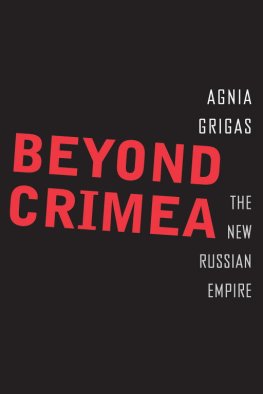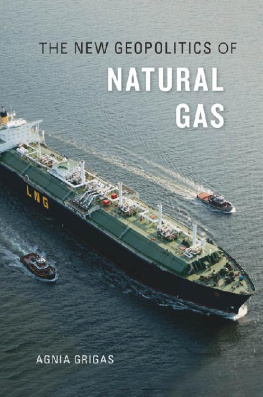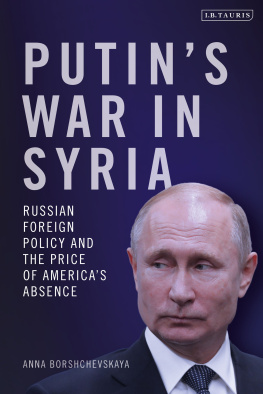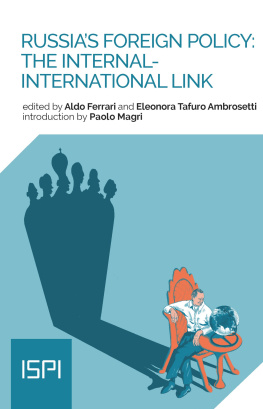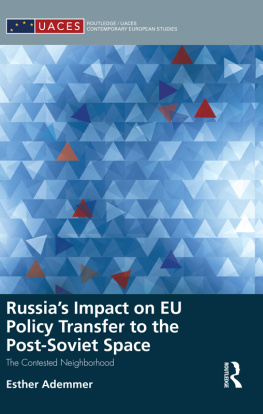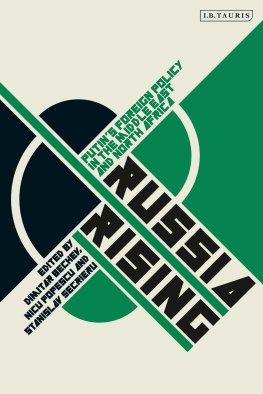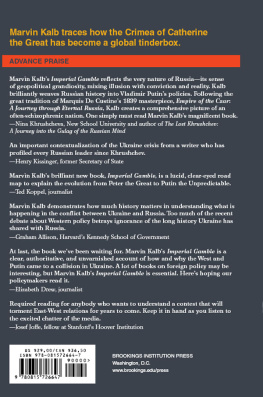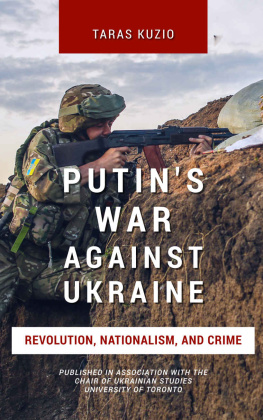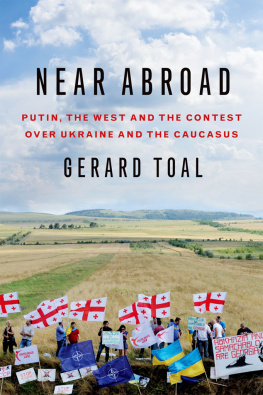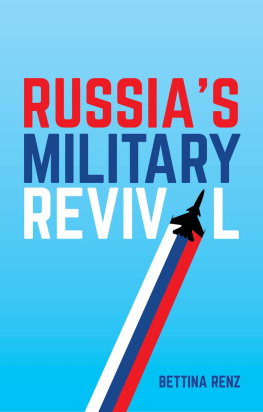Agnia Grigas
BEYOND CRIMEA
THE NEW RUSSIAN EMPIRE
THIS WORK, WHICH COVERS fifteen different states and another half-dozen breakaway territories composed of numerous nationalities and ethnic groups, has been made possible only by the insights, comments, and research assistance of regional experts as well as scholars of Russia. Here I would like to acknowledge in-country scholars, experts, and event participants who provided local language skills and insights for the country case studies or helped conduct interviews in remote places and frozen-conflict zones. In my work on Ukraine I am grateful for the assistance of Dmytro Kondratenko and the insights of Dmytro Levus and Lilia Muslimova. For research on Georgia, I would like to acknowledge the help of my research assistant Tengiz Sultanishvili, and the comments of Elguja Gvazava, Vytis Jurkonis, and Tengiz Pkhaladze. For contributing to this books analysis of Moldova, I appreciate the assistance and insights of Iuliana Marcinschi, Victor Chiril, and Dmitri Gavrilov. For contributing to my understanding of the Baltic States, I am grateful to my research assistant Lukas Trakimaviius and to Juljan Jachovi, Laurynas Kasinas, Andis Kudors, Ivan Lavrentjev, Nerijus Maliukeviius, and Raivo Vetik. For assistance with material related to Central Asia, I would like to first thank my research assistant Dinara Pisareva and in addition to acknowledge the input of Fabio Belafatti, Alexander Cooley, Nargis Kassenova, Askar Nursha, Sebastian Peyrouse, Otto Pohl, and Charles E. Ziegler. For information related to Belarus I am indebted to the assistance of Vytis Jurkonis and the comments of Pavel Usov and Roman Yakovlevsky, and regarding Armenia, I am grateful for the help of Hovhannes Nikoghosyan and the insights of Emil Sanamyan. For work on Russian compatriot policies I would like to acknowledge my research assistant Sabina Karmazinait and the insights of Ammon Cheskin.
I would also like to thank colleagues and mentors from the political science and international relations community, including Alexander Motyl, Jack Snyder, Daniel Treisman, and Douglas Becker for their comments and suggestions. I would also like to express my gratitude to my thoughtful and insightful copy editor Gavin Lewis and to academic writing coach Amy Benson Brown, who encouraged me to make this book accessible to a wide audience. My editor at Yale University Press, Jaya Aninda Chatterjee, deserves special mention for her enthusiasm for and dedication to this project from the start.
I am most grateful to nearly one hundred Russian speakers residing from the Baltic States to Central Asia, in cities and small towns, some enjoying peaceful conditions and others suffering in areas of conflict and war: protected only by their anonymity, they agreed to be interviewed for this book and offer their voices while their very presence is politicized and often exploited both by their countries of residence and by the Russian government. Finally, I alone take responsibility for all of the books content and any unintended errors or shortcomings.
CIS Commonwealth of Independent States
CSTO Collective Security Treaty Organization
DDoS Distributed denial of service
EU European Union
FSB Federal Security Service
GDP Gross domestic product
IDC Institute for Democracy and Cooperation
KGB Committee for State Security
LNG Liquefied natural gas
NATO North Atlantic Treaty Organization
NGO Nongovernmental organization
OSCE Organization for Security and Co-operation in Europe
RSFSR Russian Soviet Federative Socialist Republic
SVR Federal Intelligence Service
UN United Nations
USSR Union of Soviet Socialist Republics
CHAPTER ONE
The Return to Empire
RUSSIAS ANNEXATION OF CRIMEA in March of 2014 and the subsequent war in eastern Ukraine have alarmed European powers and the United States and raised the specter of further aggression. Just a year before the takeover of Crimea, while many Russia experts anticipated an active Russian foreign economic policy vis- -vis its neighboring states and a tug-of-war over Ukraine, none expected a military threat reminiscent of the twentieth-century conflicts or the Cold War era.1 In fact, before Russias annexation of Crimea, a consistent threat to the post-Soviet space seemed implausible. After Crimea, Donetsk, Luhansk, and Mariupol, however, Russias ability to redraw Europes map and incite wars is evident. Following upon the pro-Russian separatism and conflict in South Ossetia, Abkhazia, and Transnistria in the 1990s and 2000s, the Ukrainian conflict suggests a continuing and worrying trajectory. Revanchist and resurgent, Russia appears ready to challenge the current postCold War order. By 2015 most scholars, analysts, and Western leaders concurred that the Russian government led by Vladimir Putin has emerged as a challenger rather than a partner to Europe and the United States.2 Regardless of how the ongoing Russo-Ukrainian war unfolds in the coming years, the tensions between Russia and the West are unlikely to subside because the fundamental sources of conflict will persist. Over the next decade the questions on every Russia scholars, policymakers, and military strategists mind will remain: Will Russia seek additional territorial expansion in Eastern Europe and the post-Soviet states? Will Russia try to redraw its boundaries with the former Soviet republics? Russias annexation of Crimea and waging a shadow war in eastern Ukraine on the pretext of protecting the so-called Russian compatriots demonstrates that a reassessment of the Kremlins territorial objectives vis- -vis its diaspora residing in the former Soviet republics is imperative. Who is at risk? What military, humanitarian, propaganda, and soft power tools will Moscow utilize? Where is Russia likely to succeed in achieving its aims? Where will the Kremlin likely fail? This book addresses these questions head-on.
Since the early 2000s Russia has consistently sought to maintain and regain influence as well as has reinvigorated its efforts to expand its territory in the former Soviet Union republics. There have been a number of explanations of the driving factors of such policies. Russias ongoing influence on the foreign policy, economy, political systems, and energy sectors of the post-Soviet space and Europe has already been studied. Here, however, I will tell a story that has been overlooked, but one that Moscow has persistently pursuedthe story of Russian compatriots. This loosely defined term that the Kremlin adopted in the early 1990s refers to a wide range of approximately 25 to 150 million people living outside of the borders of the Russian Federation. Broadly the compatriots belong to two groups, which will be necessary to distinguish in the following discussion. First, in the narrowest sense they include actual ethnic Russians residing abroad, whom I will refer to as such, or simply as Russians. Second, and in a broader sense, they include both ethnic Russians and nonethnic Russians who nevertheless use the Russian language significantly or exclusively in daily life, whom I will call Russian speakers or Russophones. In the broadest sense the Russian government has sometimes even applied the term compatriots to descendants of citizens of the Soviet Union in general, including other individuals and ethnic groups who may not be Russian speakers but who hold various cultural, political, and spiritual affiliations with the Russian Federation, the historical Russian Empire, and the Russian world. In discussing these three groups together in the context of Moscows policies, I too will often call these groups Russian compatriots or just compatriots; however, many post-Soviet states resist the use of this term, as do many of the people to whom Moscow applies it. I will therefore also use more neutral terms like Russian diaspora, Russian minority/minorities, and Russian-speaking minority/minorities, and the like to refer to ethnic Russians and Russian speakers residing abroad.

